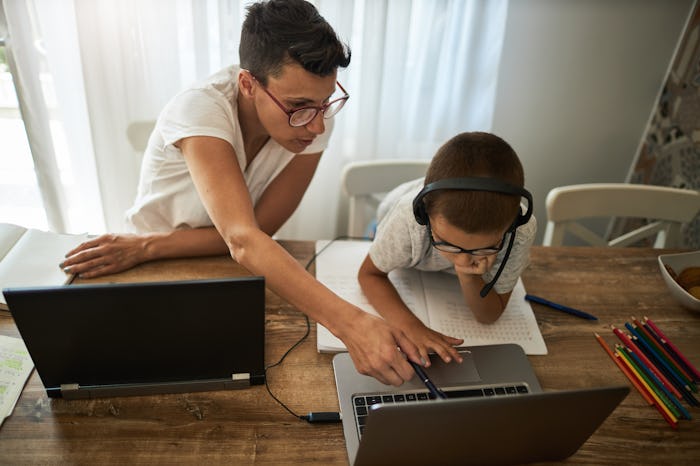Life

How Screens Affect Kids' Eyes Thanks To Increased Use & Digital Learning
Throughout the pandemic, one mantra has remained clear for parents: Whatever works. For some, this meant propping little ones in front of the TV or an iPad just to have some sort of peace. With screen time limits all but gone, how screens will affect kids' eyes with all of this increased use is a question at the top of many parents' minds.
Plus, just when you thought you were getting your kid's screen time under control during the seemingly never-ending stretch of time at home since March, the virtual school year started. Now, instead of endless video games and movies, kids are glued to their laptops for up to eight hours a day thanks to distance learning. But what does this mean for your child's eye health?
"More than a few hours a day of screen work can increase the risk of developing nearsightedness in schoolchildren," Dr. Zory Stoev, a residency trained optometrist in ocular disease and low vision rehabilitation with For Eyes tells Romper. "In addition, there have been many studies suggesting that prolonged screen work commonly results in digital eye strain, which encompasses multiple eye conditions such as dry eyes, itchy eyes, blurry vision and headaches."
Dr. Andrew Neukirch, an optometrist at Carillon Vision Care, tells Romper that optometrists focused on myopia management, or reducing the impacts of near-sightedness using FDA-approved methods, agree with the American Academy of Pediatrics (AAP) guidelines for non-essential (aka not school-related) screen time. Within these recommendations, parents of school-aged children ages 6 and older should "place consistent limits on the time spent using media, and the types of media, and make sure media does not take the place of adequate sleep, physical activity, and other behaviors essential to health."
Even when placing limits on non-essential screen time, increased use due to online learning can lead to problems if action is not taken. Dr. Neukirch recommends parents designate media-free time and locations, keep screens at arm's length away from the eyes and height at or below eye level, and keep screen brightness at the same level as the light in the room instead of brighter or dimmer.
"For those of you who are nearsighted and worry about your kids becoming nearsighted from all the screen time, this is a legitimate concern," Dr. Neukirch explains. "Make sure your child gets adequate outdoor time once schoolwork is completed each day. Studies show increased outdoor time per week may be protective against a child becoming nearsighted."
As an adult, I struggle with forcing myself to take screen breaks during work hours. Making myself stop when I'm in the middle of something to ensure that my eyes don't suffer permanent damage from staring at the light of my laptop for hours on end can be difficult. However, physicians recommend taking at least a 20-second break every 20 minutes to look at least 20 feet away. This is sometimes referred to as the 20/20/20 rule. "One way to remind children to follow the rule is to set a timer and remind them to look through a window for 20 seconds to reset their eyes," Stoev explains.
In addition to taking the necessary precautions to protect your child's eyes from damage that can be done by increased screen use, children should have annual eye exams with their optometrist. "If children are farsighted, have astigmatism, or have other conditions that affect the muscles of the eye, and they are not corrected for this, it adds additional strain," Neukirch says. Your child's doctor should be able to recommend specific products or therapies that may help with eye strain caused by increased screen use, specifically if they already deal with eye health issues.
An ounce of prevention now can go a long way toward preventing future problems. "The increased screen time amongst children can have some serious future consequences if not regulated properly," Stoev tells Romper. "The risk of increased nearsightedness can lead to some serious retinal conditions such as retinal detachment and even glaucoma depending on the case. Parents should set up some simple rules listed above and try to enforce them daily."
Experts:
Dr. Zory Stoev, residency trained optometrist in ocular disease and low vision rehabilitation, For Eyes
Dr. Andrew Neukirch, optometrist, Carillon Vision Care